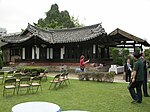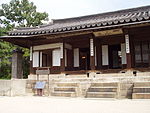Constitutional Court of Korea

The Constitutional Court of Korea (Korean: 헌법재판소; Hanja: 憲法裁判所; RR: Heonbeop Jaepanso) is highest constitutional court in judicial branch of South Korea, seated in Jongno, Seoul. Established under Chapter 6 of the Constitution of South Korea, the Court has ultimate jurisdiction over Judicial review on constitutionality of statute, review of all Impeachments, decision on Prohibition and Dissolution of political parties, competence dispute about demarcation of power among central government agencies and local governments, and adjudication of constitutional complaint. It is composed of nine Justices, and one of them is President of the Constitutional Court of Korea. The Constitutional Court of Korea has equivalent status as one of two highest courts in South Korea. Another is Supreme Court of Korea. The Court is seat for Permanent Secretariat of Research and Development in Association of Asian Constitutional Courts and Equivalent Institutions.
Excerpt from the Wikipedia article Constitutional Court of Korea (License: CC BY-SA 3.0, Authors, Images).Constitutional Court of Korea
Bukchon-ro, Seoul
Geographical coordinates (GPS) Address Phone number Website Nearby Places Show on map
Geographical coordinates (GPS)
| Latitude | Longitude |
|---|---|
| N 37.578 ° | E 126.9847 ° |
Address
헌법재판소
Bukchon-ro 15
03055 Seoul
South Korea
Open on Google Maps








